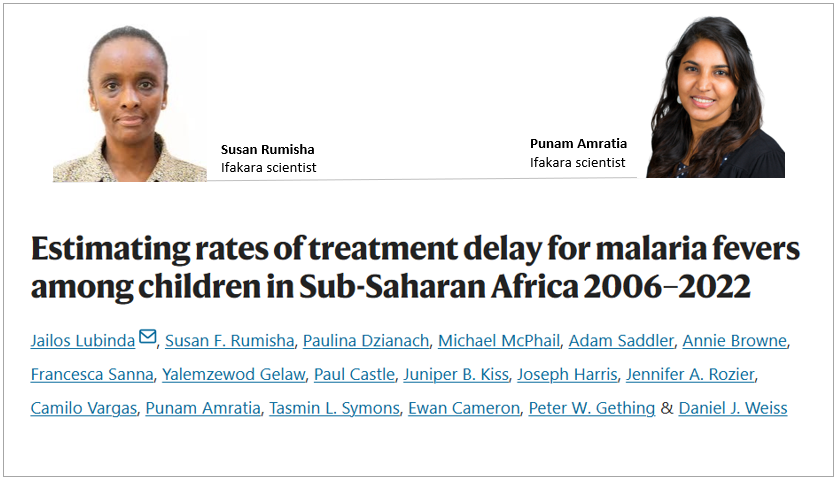
URGENT: New study reveals alarming delays in malaria treatment for children in Africa

A major new scientific study has raised urgent concern over delayed malaria treatment among children across Sub-Saharan Africa — warning that millions of young lives are put at risk when treatment does not begin within the first 24 hours of fever onset.
The research, published in Nature Communications on October 29, 2025, calls for immediate action from policymakers to improve access to timely care and prevent avoidable deaths.
Why it matters? Waiting too long can cause severe illness!
Malaria remains one of Africa’s deadliest childhood diseases. The study shows that waiting too long to treat malaria drastically increases the chances of severe illness, complications, and death. When care is delayed children face nearly three times higher risk of developing severe malaria, transmission in communities increases, outbreaks become more likely, and the effectiveness of malaria drugs decreases.
The findings highlight that 60% of treated children across Africa – that’s 6 in every 10! - had to wait more than 24 hours before receiving care — and almost one-third waited over 48 hours, affecting an estimated 33 million and 16 million children, respectively.
Behind these numbers are real families, often living far from health facilities or struggling with limited household resources. For them, delays aren't statistics — they are the daily struggle of seeking help to save a sick child.
A Tanzanian scientist leads the charge
The research was led by Dr. Susan Rumisha of the Ifakara Health Institute in Tanzania, putting Tanzanian science at the forefront of global malaria research. Dr. Rumisha played a central role in the study, which also draws on contributions from experts across several leading research organizations.
Ifakara’s involvement did not stop with one researcher — Dr. Punam Amratia, another contributor from the Ifakara Health Institute, was also part of the author team, further reinforcing Tanzania’s scientific impact on the world malaria agenda.
This work demonstrates the significant contribution of African and Tanzanian scientists in generating knowledge that influences global health decisions.
A collaboratively powered study
Beyond Ifakara, the study brought together leading scientists and research institutions from across the world. It was a team effort — with shared supervision by Peter Gething and Daniel Weiss from The Kids Research Institute Australia and Curtin University.
The partners’ list included: Macha Research Trust (Zambia); National Institute for Medical Research (Tanzania); and Perth Children’s Hospital (Australia).
What the study looked at
To understand the scale and patterns of treatment delay, researchers examined 177 nationally representative health surveys conducted between 2006 and 2022. The findings paint a complex picture:
- Somalia had the highest delay rate (76% of children waited more than 24 hours).
- Tanzania had the lowest (35.3%) — evidence of progress in malaria response.
- East Africa showed the greatest improvement, though progress has slowed since 2015.
- Central and West Africa saw worsening trends in recent years.
- Children in rural and low-income households were most affected by treatment delays.
For health services, this means a need to focus not only on treatment availability — but on speed and accessibility.
Here’s the study message to governments
The study's message to governments and health agencies is clear: reducing malaria deaths requires fast treatment. Strengthening community-level services, improving transport options to clinics, and tackling financial barriers could be game-changers.
If these delays continue, millions of children will remain vulnerable — even in countries that have made progress against malaria.
For Tanzania – the findings offer some hope!
With Tanzania demonstrating some of the lowest delay rates in Africa, the findings offer hope — and a roadmap — for other countries. The leadership shown by researchers from the Ifakara Health Institute signals the crucial role African institutions have in shaping solutions for the continent’s health challenges.
As Dr. Rumisha and her co-authors show, the science is clear: early treatment saves young lives — and the time to act is now.
Read the full article, here.
